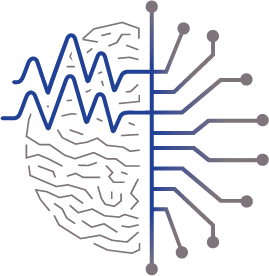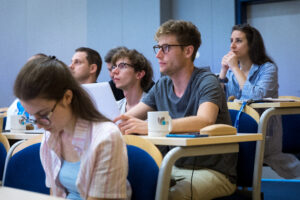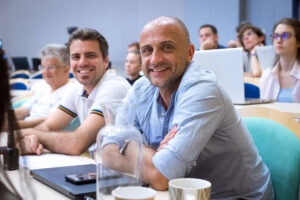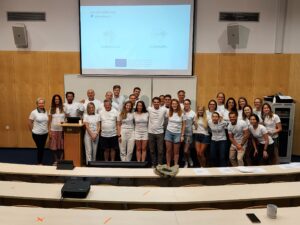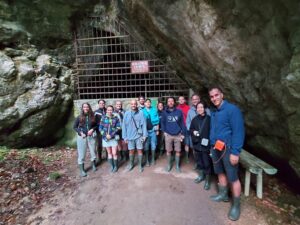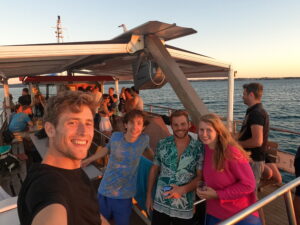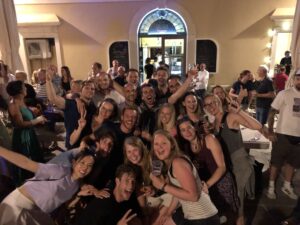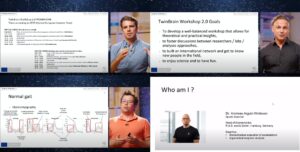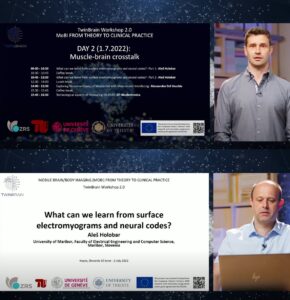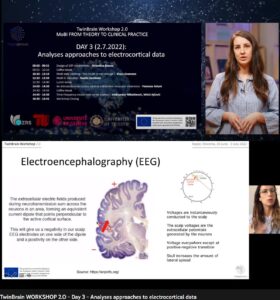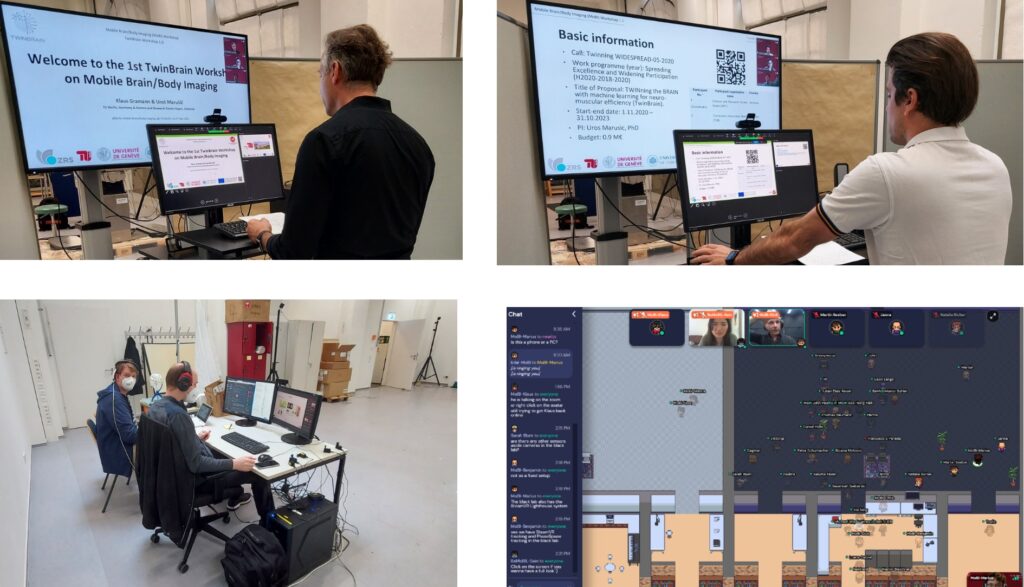Events
27-30 NOVEMBER 2023
TwinBrain Workshop 4.0
MOBILE BRAIN/BODY IMAGING (MOBI) – where theory meets hands-on experience
The TwinBrain consortium has organized the last Workshop, which took place in Koper, Slovenia. The workshop was also streamed to the online participants to maximize the reach of such content. The workshop was heavily hands-on oriented and covered advanced electroencephalography (EEG) analysis approaches. The lectures and hands-on sessions are available on the TwinBrain YouTube channel.
DAY 1
THE THEME OF THE DAY: Unfolding cognitive-motor interference: applying the unfold toolbox to mobile EEG data.
On the first day of the workshop, we welcomed Anna Wunderlich, PhD, from Berlin Mobile Brain/Body Imaging Lab (BeMoBIL) to showcase the use of the Unfold toolbox (https://www.unfoldtoolbox.org/) from the users’ perspective. The MoBI experiments often record signals arising from several sources and the crucial step in the analysis is to disentangle the effects of these sources if we were to make claims about how the brain processes information while in motion. The Unfold toolbox is a deconvolution toolbox for overlapping EEG signals and (non)-linear modeling. Anna briefly introduced the topic (an introduction and theoretical background has previously been explained in a talk by one of the authors, Benedikt Ehinger, and is available online (https://www.youtube.com/watch?v=wb-v5LRTuiw&t=3912s) followed by two extensive hands-on sessions. Anna demonstrated how to use Unfold to adjust for overlap between subsequent potentials using linear deconvolution by modeling multiple events, specifically the onset of Fixation Cross, Stimulus, Response, Heel Strikes, and Blink- and Saccade-related brain activity. This deconvolution approach was applied to the TwinBrain Clinical Trial data for both the balance and overground walking experiments (read more about the tasks in our protocol: https://pubmed.ncbi.nlm.nih.gov/38009088/). We were able to show how separating the effects of interest from the effects of other sources improved the
unambiguity of the EEG results.
DAY 2
THE THEME OF THE DAY: Analyzing the spatio-temporal profile of contrast and motion-onset visual-evoked potentials using high-density EEG
The second day of the workshop was dedicated to the analysis of the visual evoked
potentials in EEG. We welcomed Thorben Hülsdünker, PhD, from LUNEX University who thoroughly explained how the human visual system works and how to apply this knowledge when designing the experiments. Specifically, we focused on understanding and dissociating the contrast- and color-sensitive visual system from the motion-sensitive visual system. We learned how to optimize the specific stimuli characteristics if we were to use them to evoke an effect of either the contrast-sensitive or the motion-sensitive cells. Thorben’s rich bibliography on the respective topics intelligently demonstrates that in sports, the processing in the motion sensitive areas plays a more important role for performance optimization as compared to the contrast- and color-sensitive areas, which has been under-addressed in the literature for a long time.
DAY 3
THE THEME OF THE DAY: Towards the network analysis approach – investigating functional connectivity using hdEEG
On 29 November we welcomed Marco Marino, PhD, from University of Padua, who took us on the journey of discovering brain communication. Marco’s specialty lies in network analysis, which is a useful approach for investigating the relatedness of different brain regions by assessing their function, meaning the similarities and specific patterns in their activity. This approach is especially valuable when investigating the functional connectivity between different brain areas, neuroplasticity, or other processes that depend on a cascade of events or are associated with specific brain states, such as the task-free related default-mode network (DMN). Marco introduced us to the in-house build Noninvasive Electroencephalography Toolbox (NET) for large-scale analysis of hdEEG data, freely available on GitHub (https://github.com/bind-group-kul/net).
DAY 4:
THE THEME OF THE DAY: Hands-on sessions (individual data analysis)
On the last day of the workshop, we continued working on the individual datasets from the TwinBrain Clinical Trial applying the Unfold deconvolution methods, VEP analysis and more.
19–24 JUNE 2023
TwinBrain Summer School 3.0:
NEUROSCIENCE OF MOVEMENT – EXPLORING THE DYNAMICS OF THE HUMAN BRAIN IN MOTION
The TwinBrain Summer School 3.0 hosted an international team of experts who shared the latest neuroscience discoveries in movement-related topics and explored how brain imaging technology contributes to understanding brain function and disease development. Advancements in wireless and portable technologies have extended experimentation into real-life scenarios, reflecting everyday experiences. The distinguished experts from Slovenia, Germany, Belgium, Italy, Luxembourg, the
Netherlands, France, Switzerland and the USA presented cutting-edge developments in Mobile Brain/Body Imaging (MoBI).
Professor Dr Nico Bohnen, MD, a renowned radiology and neurology expert from the
University of Michigan, delivered the keynote speech for this year’s summer school. With a dedicated career focused on Parkinson’s disease research and treatment, which affects over 8.5 million people worldwide, Prof. Dr Bohnen strives to discover innovative approaches that enhance the independence and quality life of individuals with Parkinson’s disease and the elderly population. His lecture, held on Tuesday, 20 June 2023, at the town hall of the Municipality of Piran, revolved around the neurobiological basis of walking and balance problems in Parkinson’s disease. Utilizing positron emission tomography (PET) to explore metabolic and biochemical brain processes, he presented the mechanisms underlying the disease’s development and progression, along with novel treatment approaches for more effective and holistic patient care.
2 APRIL 2023
TwinBrain WORKSHOP 3.0
ADVANCES IN MOVEMENT DISORDERS DIAGNOSIS AND REHABILITATION: FROM NEW TECHNOLOGIES TO CLINICAL PRACTICE
The Università degli Studi di Trieste (Italy) hosted the third MoBI workshop from March 30th to April 1st, 2023 at Hotel Savoia Excelsior Palace Trieste. The workshop was streamed live allowing for interactions among participants and presenters.
The following sessions were offered to participants:
Session 1: Neurophysiology and Biomedical Engineering in Movement Disorders
- Neurophysiology Studies in Movement Disorders (Paolo Manganotti, Italy)
- Neuroimaging and EEG in Parkinson’s Disease (Miloš Ajčević, Italy)
- Exploring Muscle-Brain Crosstalk in Parkinson’s Disease Using Mobile Brain/Body Imaging (Uroš Marušič and Miloš Kalc, Slovenia)
- Neural Mechanisms of Cognitive-Motor Dual Tasking in Early Parkinson’s Disease: Preliminary Results of the Ongoing TwinBrain Project Clinical Trial (Manca Peskar, Slovenia)
- Using Inertial Motion Sensors to Assess the Effect of Noninvasive Vagal Nerve Stimulation on Gait in Advanced Parkinson’s Disease Patients (Vesna M. van Midden, Slovenia)
- Movement Analysis in Movement Disorders (Eleonora Guanziroli, Italy)
Movement for Movement Disorders: The Physiological Role of Actice and Assisted Excercise (Alex Buoite Stella, Italy)
Which Rehabilitation in Parkinson’s Diseases (Daniele Volpe, Italy)
The Gait in Freezing Phenomenon and Rehabilitation (Susanna Mezzarobba, Italy)
- Clinical Picture and Therapy, the Experience of Trieste University Hospital (Mauro Catalan, Italy)
- Neuroimaging in Movement Disorders (Maja Trost, Slovenia)
- Deep Brain Stimulation: Current Indications and Future Perspectives (Maria Chiara Malaguti, Italy)
- Deep Brain Stimulation: Clinical Picture and Possible Rehabilitation (Vladimira Vuletić, Croatia)
- The Energy Cost of Human Locomotion – From Theory to Good Practice (Carlo Capelli, Italy)
- Practical Session 1: How to assess and study movement disorders
- Practical Session 2: Application of technology based rehabilitation strategies
- Practical Session 3: TwinBrain – MOBI technology in action
Download the TwinBrain Workshop 3.0 flyer.
16 FEBRUARY 2023
OKROGLA MIZA:
APLIKATIVNA VREDNOST ZNANOSTI: »Če ni znanosti, če ni raziskav, potem je težko delati prenos znanja, ker je znanja malo…«
V okviru projekta TwinBrain, ki ga izvaja Inštitut za kineziološke raziskave ZRS Koper, je 16. februarja 2023 v knjižnici ZRS Koper potekala okrogla miza z naslovom »Aplikativna vrednost znanosti – na stičišču znanja in prakse«. Beseda je tekla o tem, kako uspešno gostje in njihove institucije zagotavljajo aplikativnost znanosti v prakso, kje so problemi in kje dobre prakse. Pogovor je povezovala dr. Saša Pišot, znanstvena sodelavka iz Inštituta za kineziološke raziskave ZRS Koper.
Več si lahko preberete TUKAJ.
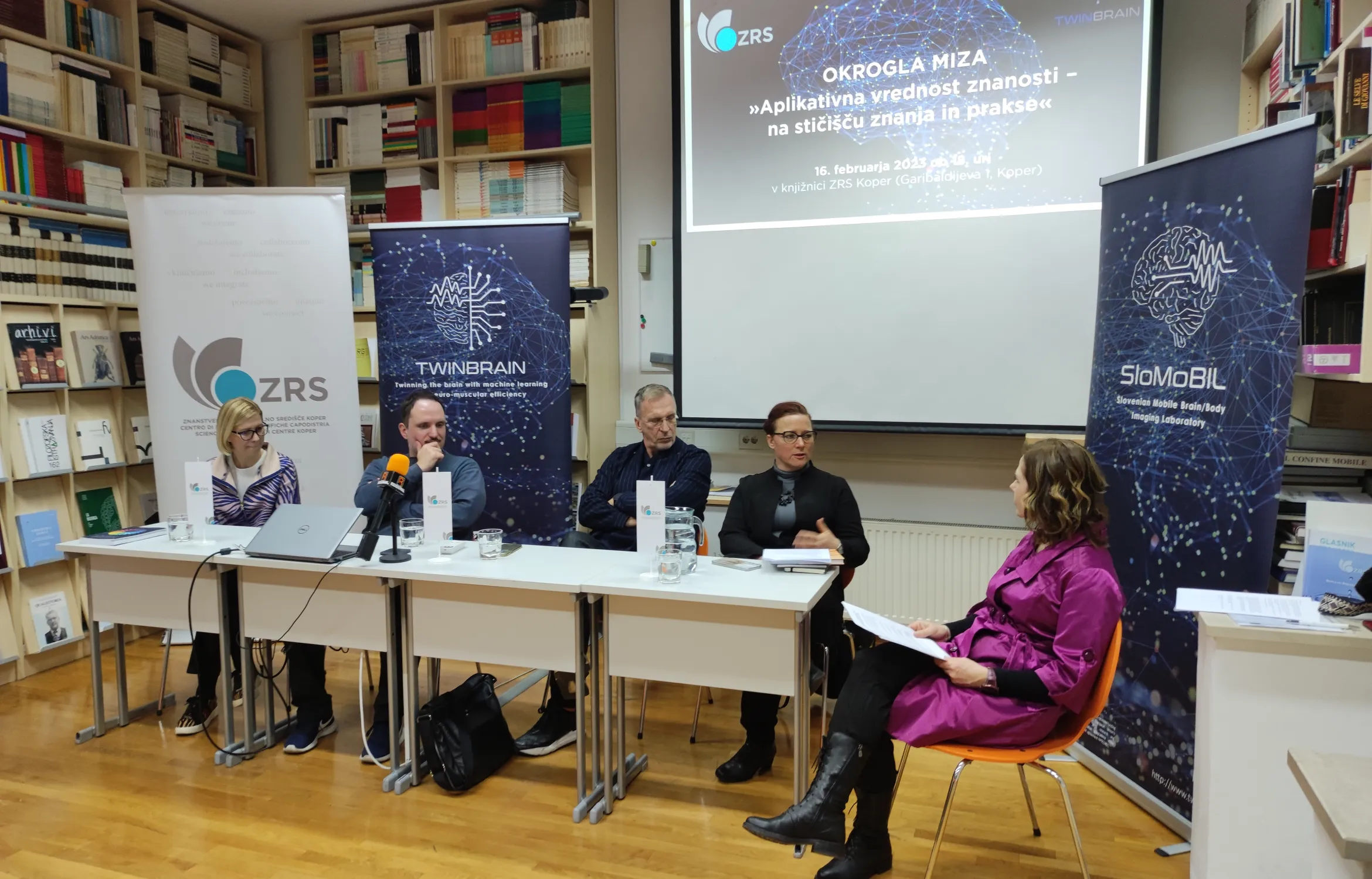
9 JULY 2022
TwinBrain Summer School 2.0:
Neuroscience of movement: EXPLORING BRAIN DYNAMICS IN PARKINSON‘S DISEASE AND RELATED DISORDERS
TwinBrain Summer School 2.0 was held in Piran from July 5th to July 9th, 2022. Students of kinesiology and movement science, physiotherapy, psychology, cognitive (neuro)science, biomedical engineering, and related fields attended Summer School both in-person and online.
The following modules were offered to participants:
Module 1: Mobile Brain/Body Imaging (MoBI) – linking human behavior with brain responses
- Neuroscience of movement: Exploring brain dynamics in Parkinson’s disease and related disorders: Uroš Marušič (Slovenia)
- Linking human behavior with brain responses using Mobile Brain/Body Imaging: Klaus Gramann (Germany)
- Hands-on: Demonstration of mobile EEG: Anna Wunderlich (Germany)
- Cognitive-motor performance in virtual scenarios – behavioral results and neuronal correlates using fNIRS: Claudia Voelcker-Rehage and Robert Stojan (Germany)
- Measuring variability in human movement – Theory and methodology: Julian Rudisch (Germany)
- Keynote lecture: “A walk through a century of Alzheimer’s disease diagnosis and treatment”: Bruno Giordani (USA)
Module 2: Biomarkers of cognitive decline and dementia (Moderator: Bruno Giordani)
- Biomarkers of neurodegenerative diseases: Martin Rakuša (Slovenia)
- Cortical biomarkers for detecting cognitive decline and dementia: Voyko Kavcic (USA)
- Comparing the brain of a healthy elderly person with mild cognitive impairment: A mathematical perspective: Rok Požar (Slovenia)
- Development of scalable and non-invasive diagnostic tools for mild cognitive impairment and dementia: Jurij Dreo (Slovenia/Malta)
Hands-on: Demonstration of mild cognitive impairment screening using EEG
Module 3: Neuroplasticity after injury and neurorehabilitation: Bio- and neurofeedback technologies
- Cortical adaptations after musculoskeletal injuries: Florian Giesche (Germany)
- Physical and mental fatigue: From the fundaments to the application: Bart Roelands (Belgium)
- Application of biofeedback/neurofeedback technology: Duško Lepir (Bosnia and Herzegovina)
- Hands-on: Application of biofeedback/neurofeedback technology: Duško Lepir (Bosnia and Herzegovina)
Module 4: Multisensory integration and attention in aging and disease
- Attentional focus and motor learning – From theory to hands-on: Reza Abdollahipour (Czechia)
- Virtual reality research – Assessing speed of processing: Darko Katović (Croatia)
- Hands-on: Demonstration of VR assessment tool
Module 5: Exercise and the brain in health and disease
- Multisensory integration in healthy and pathological aging: Links to cognitive and motor functioning: Jeannette R Mahoney (USA)
- Hands-on: Demonstration of mobile-based clinical multisensory assessment tool
- Biosignal-based brain-controlled devices: Applications in neurorobotics: Kevin De Pauw (Belgium)
- Preparing to move – Contribution of anticipatory brain activities in healthy and clinical populations: Valentina Bianco (Italy)
Extra module: Career Counseling
Download the TwinBrain Summer School 2.0 flyer.
Video content is available HERE.
2 JULY 2022
TwinBrain Workshop 2.0:
Mobile Brain/Body Imaging (MoBI) from theory to practice
The Slovenian Mobile Brain/Body Imaging lab (SloMoBIL) at the Science and Research Centre Koper (ZRS Koper) hosted the second MoBI workshop from June 30th to July 2nd, 2022. The workshop was streamed live allowing for interactions among participants and presenters.
The following modules were offered to participants:
Module 1: Biomechanics of human movement
- MoBI: from theory to clinical practice (Uroš Marušič, Slovenia)
- Biomechanics of human gait (Andrej Olenšek, Slovenia)
- Kinematic analysis of repetitive movements (Andreas Argubi-Wollesen, Germany)
- Inertial motion capture for human kinematics (Erik Bakke, USA)
Module 2: Muscle-brain crosstalk
- What can we learn from surface electromyograms and neural codes? (Aleš Holobar, Slovenia)
- Exploring Neuromechanics of Movement with Motoneuron Interfacing (Alessandro Del Vecchio, Italy)
- Technological aspects of measuring HD-EMG (OT Bioelettronica)
Module 3: Analyses approaches to electrocortical data
- Design of ERP experiments (Valentina Bianco, Italy)
- MoBI data cleaning – too much or not enough? (Klaus Gramann, Germany)
- MoBI IC classifier (Noelle Jacobsen, USA)
- Time-frequency neural time-series analysis (Aleksandar Miladinović, Miloš Ajčević, Italy)
Download the TwinBrain Workshop 2.0 flyer.
Video content is available HERE.
15 FEBRUARY 2022
Round table discussion:
Women in science: A System of Equality ≠ Equal Opportunities
On the 15th of February 2022, a few days after an International day of women in science, a round table discussion on Women in science: A System of Equality ≠ Equal Opportunities was held at the Koper Theater. Invited guests dr. Ana Rotter, prof. dr. Nadja Furlan Štante, prof. dr. Bettina Wollesen, PhD student Anna Wunderlich, prof. dr. Lenart Škof, and prof. dr. Rado Pišot talked about the extent to which the equality system also represents equal opportunities for both sexes based on their own experience. They presented good practices, highlighted existing barriers, and discussed what it means to implement Gender Equality Action Plans for management and employees. The discussion was moderated by dr. Saša Pišot.
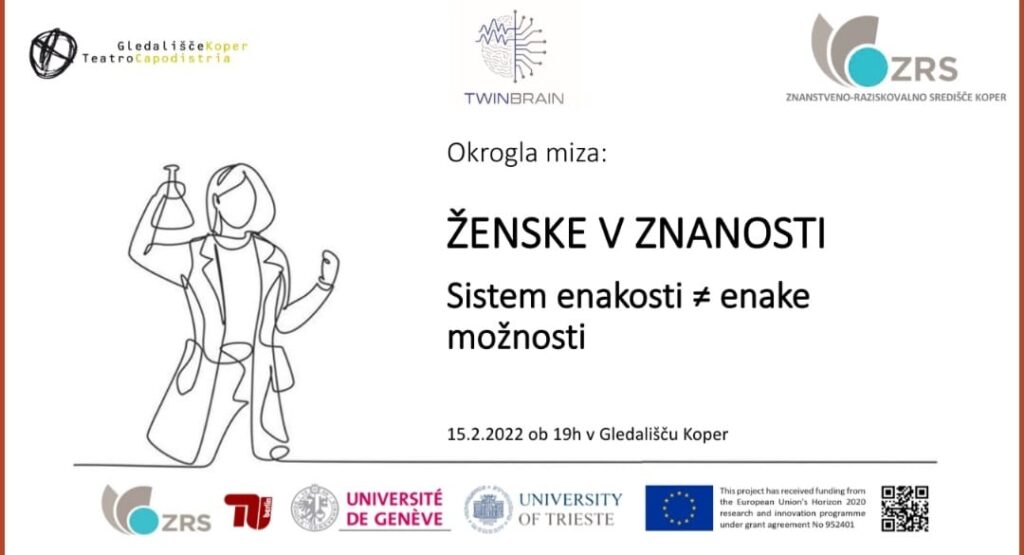
10 JULY 2021
TwinBrain Summer School 1.0:
Neuroscience of movement: Exploring the dynamics of the human brain in motion
TwinBrain Summer School 1.0 was held in Piran from July 6th to July 10th, 2021. Students of kinesiology and movement science, physiotherapy, psychology, cognitive (neuro)science, biomedical engineering, and related fields attended Summer School both in-person and online.
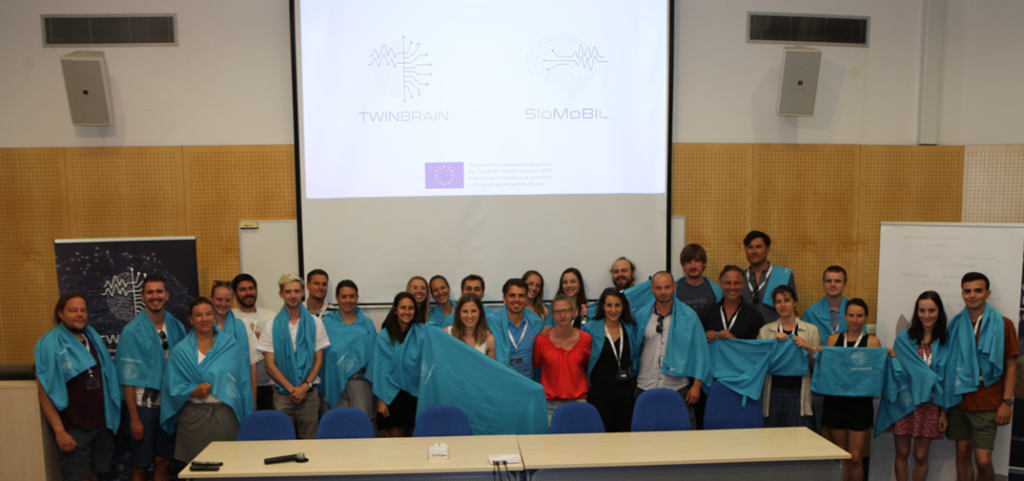
The following modules were offered to participants:
Module 1: Crosstalk between human motion (neuro)science, psychology, and biomedical engineering
- Strategies for cognitive-motor training | Bettina Wollesen (Germany)
- Motor-cognitive interactions – lines of research and principles of training | Claudia Voelcker-Rehage (Germany)
- Hands-on session | Bettina Wollesen and Claudia Voelcker-Rehage (Germany)
- Understanding gait and balance control for falls prevention | Eling De Bruin (Sweden)
- Keynote lecture: Learning to Move on Earth and In Space | Rachael D. Seidler (USA)
Module 2: From brain to muscles, from muscles to brain Part I
- Muscle-brain crosstalk in everyday life | Rado Pišot (Slovenia)
- Biomechanics of skeletal muscle | Boštjan Šimunič (Slovenia)
- Electromyography – from methodology to practice | Ramona Ritzmann (Switzerland)
- Decomposing the brain-to-muscle interface with peripheral nerve stimulation | Sidney Grospretre (France)
Module 3: From brain to muscles, from muscles to brain Part II
- Estimation and interpretation of neural codes in surface electromyograms – from the brain to muscles | Aleš Holobar (Slovenia)
Module 4: Neuroplasticity after injury and neurorehabilitation
- Brain activation changes after musculoskeletal injuries – potential implications for rehabilitation and return to sports | Florian Giesche (Germany)
- Electrophysiological control of robotic devices – where neurophysiology meets bioengineering | Kevin De Pauw (Belgium)
- Advances in neurorehabilitation – improving motor control with brain-computer interfaces | Milos Ajcevic & Aleksandar Miladinovic (Italy)
- Using fNIRS in virtual environments to study brain function during complex cognitive-motor behavior | Robert Stojan (Germany)
Module 5: Challenges for future research avenues in the neuroscience of movement
- Imaging Human Brain Dynamics in Motion – why and how? | Klaus Gramann (Germany)
- Organization of large-scale brain networks in ambulatory setups | Martin Seeber (Switzerland)
- Brain Regulation of Exercise – Implications for Health and Performance | Eduardo Bodnariuc Fontes (Brazil)
Extra module: Career Counseling
Video content is available and can be shared via email upon request: uros.marusic@zrs-kp.si.
On the 8th of July, we had an official opening ceremony of the Slovenian Mobile Brain/Body Imaging lab (SloMoBIL).
31 May 2021
Piloting: Experimental protocol with mobile EEG, optical gait systems, and motion trackers
In the period MARCH – MAY 2021 Slovenian researchers were hosted by a German partner at the Berlin Mobile Brain / Body Imaging Lab (BeMoBIL) at the Department of Biopsychology and Neuroergonomics (Berlin Institute of Technology).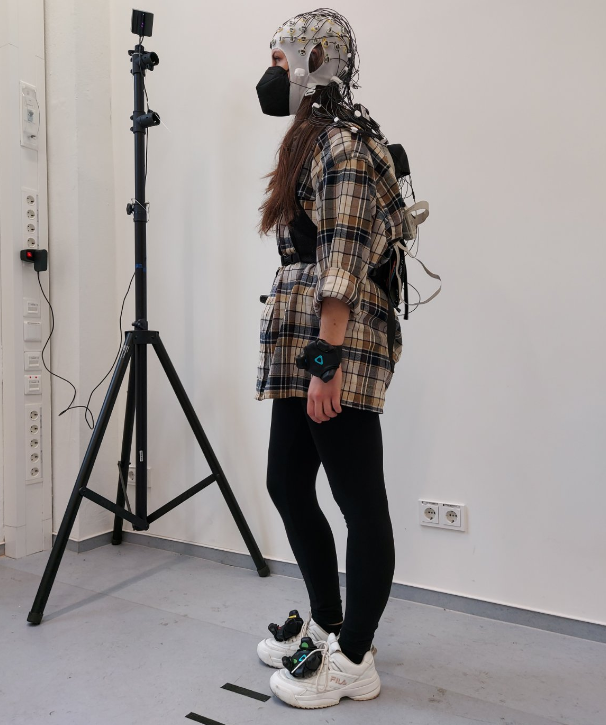
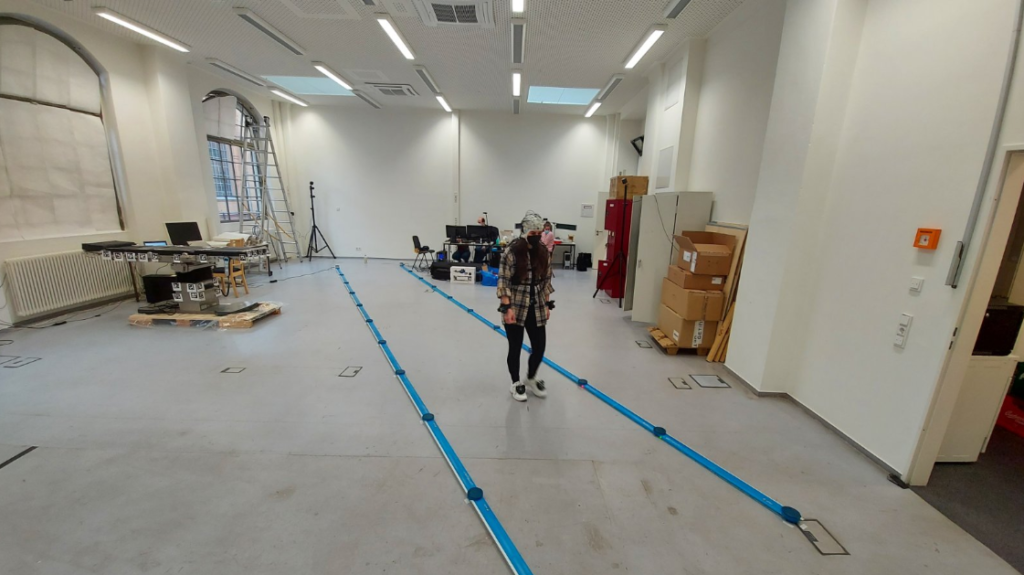
27 MAY 2021
TwinBrain Workshop 1.0:
Mobile Brain/Body Imaging (MoBI)
The Berlin Mobile Brain/Body Imaging labs (BeMoBIL) at the Berlin Institute of Technology hosted the first MoBI workshop from May 25th to May 27th, 2021. The workshop was streamed live allowing for interactions among participants and presenters.
The following lectures were offered to participants:
- Trial-by-trial EEG source dynamics predict the speed of gait adaptation | Johanna Wagner
- MoBI Gait-related Activity and Source Reconstruction of MoBI data | Martin Seeber
- Lab tour BeMoBIL | BPN team
- MoBi meets Android: Current Developments and Future Directions | Sarah Blum
- Mobile Brain/Body Imaging (MoBI) – What, Why, How? | Klaus Gramann
- Multi-modal data recording (LSL) | Laurens Krol
- Data import & BIDS | Sein Jeung
- Motion Preprocessing | Sein Jeung
- EEG Data Preprocessing | Marius Klug
- Independent Component Analysis | Marius Klug
- ICA Interpretation | Anna Wunderlich
- Event extraction | Anna Wunderlich
- Clustering Group Level Analysis | Marius Klug
- Key Note: Mobile Brain Imaging of Human Movement with High-Density Electroencephalography | Daniel P. Ferris
- MoBI Gait Biomechanics | Bettina Wollesen, Uros Marusic
- MoBI EEG Gait Analysis | Martin Seeber
- Unfold Toolbox I | Benedikt Ehinger, Olaf Dimigen
- Unfold Toolbox II | Benedikt Ehinger, Olaf Dimigen
23 December 2020
TwinBrain Journal Club:
Cognitive-motor interference and attentional reserve
On December 23th 2020 we held the first TwinBrain journal club. Selected publications investigating the interplay between cognition and locomotion using EEG were discussed, focusing particularly on neurophysiological biomarkers such as event-related P3 response and theta oscillations.
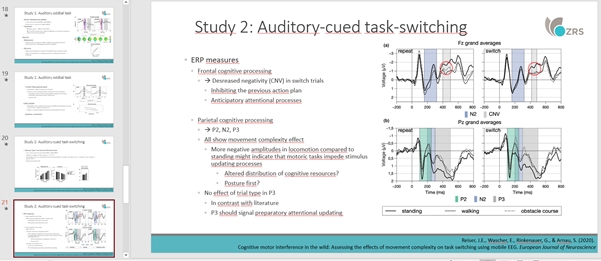
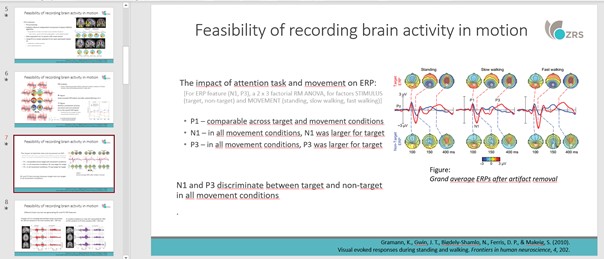
10 DECEMBER 2020
Introduction to EEG feature extraction with machine learning
As part of the TwinBrain education, we organized an online workshop on basic machine learning concepts and their benefits for EEG analysis. The workshop was held on December 10th, 2020. Hands-on examples were presented using the BCILAB toolbox.
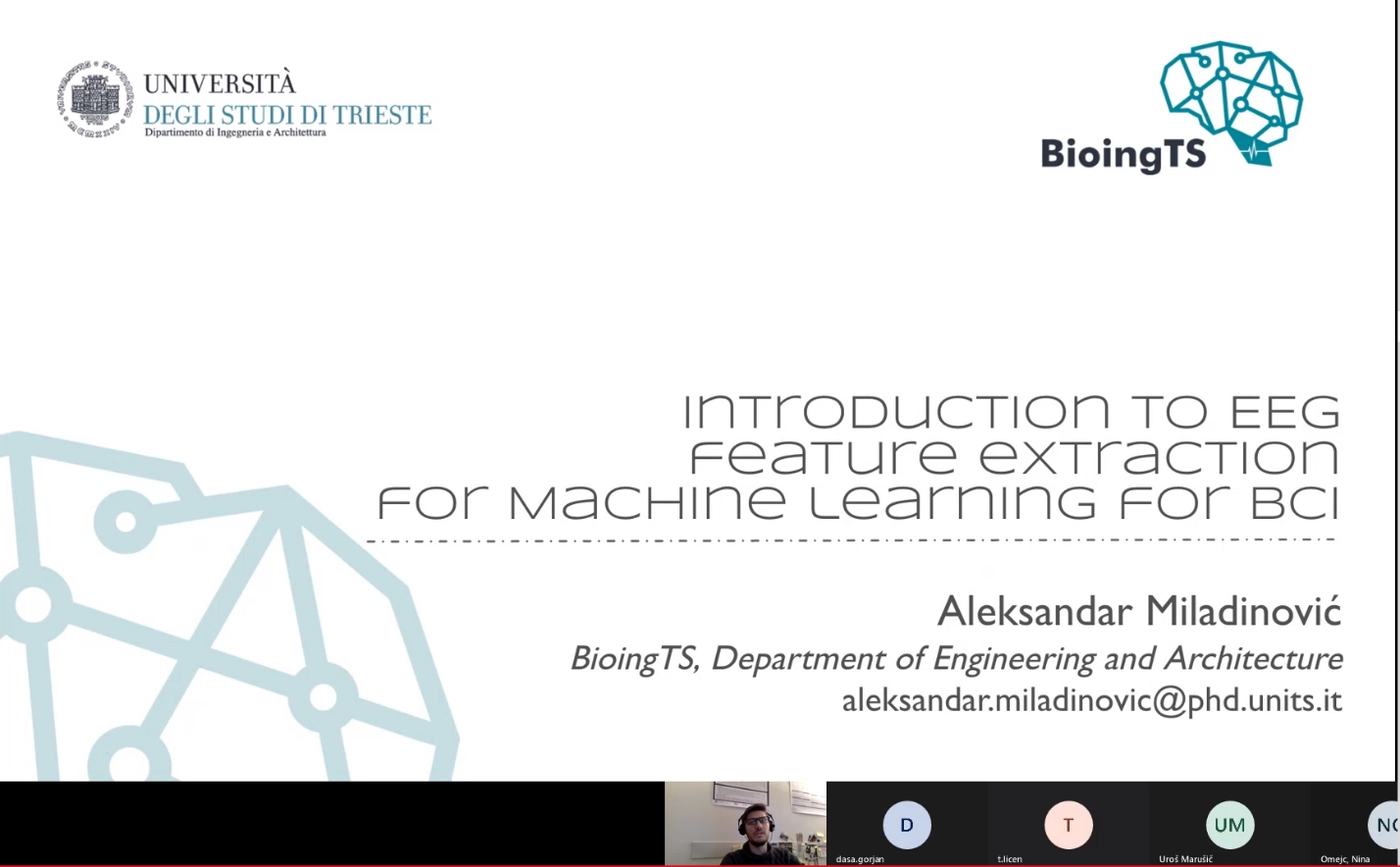
DECEMBER 2020
Piloting: Experimental protocol with an EEG system recorded during cyclic movements.
Starting in December 2020, we conducted a study using an EEG system during a cycling protocol to assess electrocortical activation patterns during cyclic movements in healthy adults.

DECEMBER 2020
Pilot measurements with a mobile EEG system
From December 2020, we conducted pilot measurements with the mobile EEG system to assess cognitive-motor interference in healthy adults.


